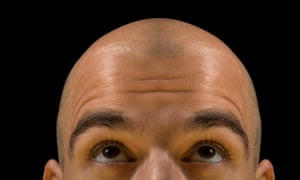Baldness and rashes? Experts split over unusual Covid-19 risk factors and symptoms
Baldness and rashes? Experts split over unusual Covid-19 risk factors and symptoms
Academics analyse whether hair and hearing loss may also be linked to coronavirus
From hearing loss and rashes, to being tall and bald, as the Covid-19 pandemic develops, a host of new symptoms and risk factors are being linked to the virus. We take a look at the evidence.
Hair loss
Some Covid-19 patients have reported hair loss, but these are anecdotal reports rather than studies.
“We have seen a few people reporting it, but we don’t know if it is significant or not,” said Tim Spector, professor of genetic epidemiology at King’s College London and lead researcher of the Covid-19 symptom study
While the virus may be to blame, experts say there are other explanations.
“A form of hair loss called telogen effluvium can result in temporary hair loss as a result of a number of triggers including fever and severe illness, which may explain some cases of hair loss reported with Covid-19 infection,” said Dr Tanya Bleiker, clincial vice president of the British Association of Dermatologists.
Rashes
Many viral infections can affect the skin, with researchers in Spain reporting five types of rash linked to Covid-19.
Spector and colleagues say their work has revealed there are three kinds of rashes associated with the disease: an itchy, hive-type rash, small red bumps akin to a chickenpox-type rash, and purplish bumps resembling chilblains on the fingers or toes. The latter, they say is the most specific to Covid-19 and has been dubbed “Covid toe”.
“About one in 12 people have a definite rash and we might be missing others because they are very subtle,” Spector said. “It can often occur before any classic symptoms or instead of the classic symptoms.”
Hearing loss
A systematic review of evidence revealed some reports of hearing loss in people who have had Covid-19 but the quality of the studies was low.
However, subsequent work by the same team found 16 of 121 patients admitted to hospital with Covid-19 who completed a survey reported changes to their hearing eight weeks after discharge.
Kevin Munro, professor of audiology at the University of Manchester, who led the research, said he had received myriad emails from people reporting hearing problems after having Covid-19.
“In theory, there could be a link because we do know some viruses can cause hearing loss, measles and mumps for example,” he said, adding Covid-19 can cause Guillain-Barré syndrome – a condition that affects the nerves and is linked to auditory neuropathy.
But Munro said hearing assessments of the 16 patients were needed, as well as studies looking at how long any hearing changes may last.
Being tall
According to one study, which has not undergone peer review, taller people have a greater risk of contracting Covid-19, something the team behind the work suggests supports the idea that the disease spreads via aerosols.
But experts have questioned the way the study was conducted. “In my view this analysis does not even provide convincing evidence that tall people are protected from the infection never mind whether this means that there is aerosol transmission,” said Paul Hunter, a professor of medicine at the University of East Anglia.
Being bald
A number of small studies have linked being bald to a greater risk of being admitted to hospital with Covid-19, something researchers have said could be connected to male sex hormones called androgens which are linked both to male pattern baldness and the ability for the coronavirus to enter human cells.
But experts caution more work is needed. “When you are just looking at a few people in intensive care units, because they are generally middle-aged or elderly males who are overweight, if a lot of them have lost hair, you are going to get that impression,” Spector said.
Allan Pacey, a professor of andrology at the University of Sheffield, said androgens appeared to be linked to Covid-19 risk but that the link to baldness probably arose because it was a marker of such hormone levels – as are other body features. “You could probably link it to chest hair,” he said.

Comments
Post a Comment